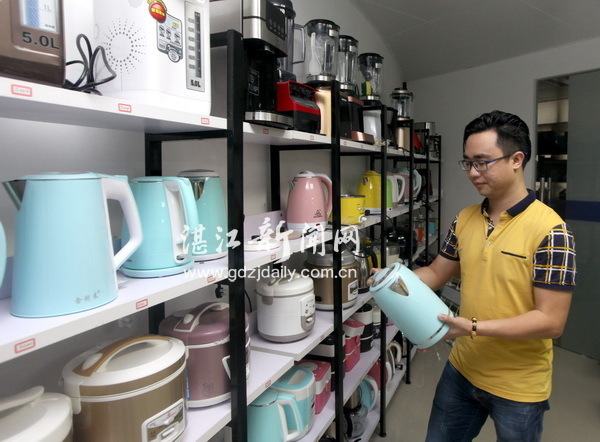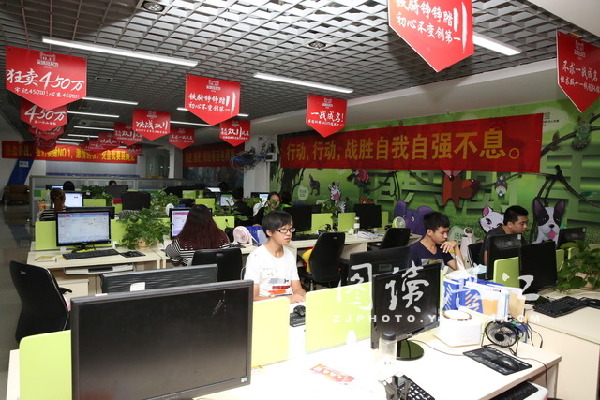Home> Innovation
Zhanjiang maker skyrockets small household appliances sales
A young entrepreneur from Zhanjiang, a coastal city in Guangdong province, has shot to fame after his new e-commerce business selling small household appliances achieved red-hot sales, becoming the top vendor for electric kettles on China's leading online retail platform Tmall in just one year.
Zhu Fengmao and six friends created their start-up Zhanjiang Jingdian E-commerce Co in 2014 and struck gold almost instantly, making 10 million yuan ($1.4 million) of sales in their first year, rising to 60 million yuan in 2015.
The same year, the small outfit rocketed to the top of the sales charts for electric kettles on Tmall, the huge e-commerce platform run by Alibaba that accounts for more than 54 percent of China's business-to-consumer online retail market, according to market researcher iResearch China.
 |
Zhu Fengmao, chairman of the board of Zhanjiang Jingdian E-commerce Co and dean of Qianxingzhe E-commerce Institute, inspects household appliances. [Photo by Liu Jicheng/gdzjdaily.com.cn] |
The company now operates more than 10 brands selling products on more than 20 online stores on e-commerce platforms including Taobao, JD and Tmall, with total monthly sales this year averaging more than 8 million yuan.
Though Zhu's company has enjoyed lightning-fast growth, the millennial's journey to the top has been a slower affair.
Zhu's focus on household appliances is no accident. He was born in Zhanjiang during the 1980s, just when the city was starting to emerge as one of the world's biggest manufacturing hubs for small electric appliances such as rice cookers. The city produced half of China's rice cookers in 2015.
After graduating from the university, he worked at a family factory to learn about running a business, before striking out on his own to found a company manufacturing and selling paper products.
However, his company soon ran into similar problems experienced by many Chinese companies in traditional industries, as poor market forecasting and slow production processes hindered the growth of his business. It dawned to him that an improved marketing system with innovative technology is the key to success.
So in 2014 he set up his e-commerce start-up in Zhanjiang's Zhiyuangu business incubator.
 |
Zhanjiang Jingdian E-commerce Co now has more than 100 employees. [Photo/zjphoto.yinsha.com] |
His timing proved to be perfect, as the very next year the Chinese government launched its Internet Plus strategy to upgrade conventional industries by integrating new internet and information technology.
"The threshold to the e-commerce sector is not high, but it is never easy to succeed," said Zhu. "I am really grateful for the government's support and the professional training offered by the incubator."
Zhu is now looking to help other entrepreneurs achieve similar success, establishing the Qianxingzhe E-commerce Institute in 2015. The center provides budding e-commerce tycoons with free office space and facilities, and all students can attend free e-commerce training classes for three months.
And he also has big plans to continue expanding his e-commerce empire. This March, he purchased the Shanghai appliances brand Rongxin, and is now selling its products via Tmall, with monthly sales volumes reaching 1.5 million yuan.
He divides the domestic market into four parts by geographical location, and plans to open several storage centers in Wuhan, Zhongshan, Zhanjiang and Lianjiang.
His ultimate aim is to expand his business from e-commerce to the media sector.
"I want to be the e-commerce leader in western Guangdong," said Zhu.

 Print
Print Mail
Mail 5G construction supports Zhanjiang's high-quality development
5G construction supports Zhanjiang's high-quality development
 Acting mayor inspects project construction in Xuwen, Leizhou
Acting mayor inspects project construction in Xuwen, Leizhou Zhanjiang island an "egret paradise"
Zhanjiang island an "egret paradise"  Dancing egrets add vitality to Xiashan
Dancing egrets add vitality to Xiashan